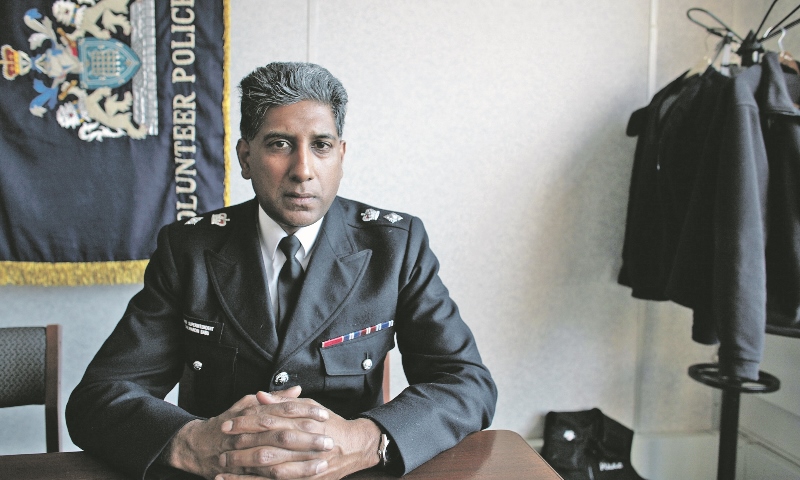For 32 years, Jawaid Akhtar was proud to call himself a member of the West Yorkshire Police Force yet at the start of 2014, he finally called time on his long-standing career and became ‘just Jawaid’ once again.
Involved in some of the biggest cases in West Yorkshire throughout the last four decades, he will perhaps be best remembered for spearheading the investigation into Bradford’s ‘Crossbow Cannibal’, Steven Griffiths.

His rise up the ranks eventually saw him obtain the role as West Yorkshire Deputy Chief Constable upon retirement, after beginning as just another officer in Huddersfield in 1982.
One of the very first Asian officers in the force, he helped pioneer the way for an inclusive institution, educating many and breaking down barriers.
Despite experiencing a rise in Islamophobia following cases such as 9/11 and the Lee Rigby killing, he never doubted that a career in the police wasn’t for him.
Speaking to the Asian Express, he remembered what it was like starting out as an officer and the importance of his family’s support in the early days.
“When I started in the police in Halifax in ‘82, I was one of the early few Asian officers to join the force,” he said.
“It was a very different organisation to the one now. With so few people from the BME community I guess there was a curiosity really surrounding me.
“It wasn’t so much a bad thing, just a lot of people hadn’t experienced an Asian officer before so they just wanted to know what it was all about.
“I guess you could compare it to a white person going to a very rural part of India and the local kids come out to see you because they have never seen a white person before. It wasn’t quite as extreme as that but there was certainly intrigue around us.
“As one of the first Asian officers, I felt like I had a duty to help educate others and that is something I am very proud to have done from day one to the end – It was my responsibility to help others learn.”
He added: “I came from a working-class background. My father worked in the mill, my eldest brother was a bus driver, and the other a mechanic so I wouldn’t say I was born with a silver spoon in my mouth.
“I just had an extraordinary supportive family who wanted me to go into higher education and wanted me to get a good job, which I did through the graduate scheme.”
Jawaid joined the Huddersfield branch of the police on the graduate scheme, a fast-track motion system that allowed him to rise up the ranks quickly.
It was just another thing that made him unique and stand out to others in the force.
“It was like a double whammy I guess,” he said. “As an Asian officer I was somewhat unique but to be a graduate at that time as well just added to the whole interest around me.”
Despite experiencing occasional racist slurs, Jawaid said he never once thought that the police ‘wasn’t for him’ and said there were always people there for support throughout his career.

As he began to rise up the ranks he got more and more responsibility and in one of his last investigations, he was the lead in one of Bradford’s most shocking crimes of recent memory.
The ‘Crossbow Cannibal’ case saw Stephen Griffiths murder three sex workers in the city and Jawaid was appointed Gold Commander for the investigation.
He said: “I remember sitting there one day with the senior investigating officer for that job who was Sukhbir Singh.
“I just sat there and thought, ‘who would have thought 30 years ago, on a case as significant as this, you would have an Asian gold commander and senior investigating officer’.
“Back when I was a Detective Sergeant, I went to a scene involving an Asian family and spoke to them in Punjabi. Despite me being the highest ranking officer there, they just assumed I wasn’t as important as the white officers because of the colour of my skin.
“So fast forward to the Stephen Griffiths case in 2009 and it shows how far we have come. It is one of the cases I am most proud of working on.”
Despite the improved workplace for members of the BME community in the police, Jawaid added that there was still work to be done.
“There are still so few officers in the Association of Chief Police Officers (ACPO) ranks that are from a BME background,” he said.
“Five or six years ago we were into double figures; I think there is about four left now so the challenge is still there.
“I haven’t got the magic wand or answer as to why this is the case and I’d say for anyone who can explain it, there is a degree in it for them. Profile, ambitions, support, all these things contribute. “
Jawaid is succeeded in the force by his son, Moshin, who currently works out of the Huddersfield base. On his final day, the father-and-son pair patrolled the streets for one last time, and despite his full backing of Moshin, Jawaid admits he still worries as a caring father.
“Obviously there was great sense of pride that day and almost nostalgia to be back where it all started on my final day, but this time I was with my son,” he said.
“As a parent you still sort of worry and having been in the job, and having seen what happens in terms of some of the criticism people face, being a parent it is only natural to have them worries.
“But, to see Moshin continue in the force is fantastic and he will be there for at least 30 years.”
For a man from Pakistan, who moved to the UK at the age of 10 speaking no English, to have finished up as deputy chief constable of the fourth largest force in country is something quite remarkable, it is the story of Jawaid Akhtar.














